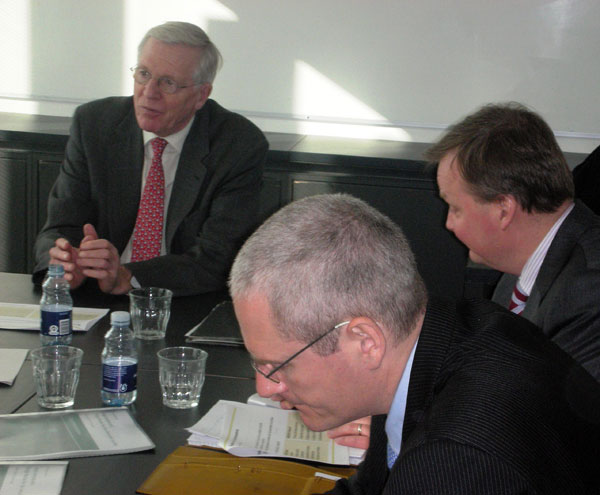 BDF and BCCA will develop a Digital Agenda Action Plan for the Baltic Sea Region that will be presented and discussed at the next BDF Summit/EU Annual Forum in Copenhagen June 2012. It will give direct inputs to the Danish EU Presidency and the European Commission on the further development of a Digital Single Market in Europe, confirming that the BSR has the potential to take a leading role in the deepening of a European Single Market. This initiative can also support the Danish EU Presidency in preparing the next version of the EU Strategy for the Baltic Sea Region.
BDF and BCCA will develop a Digital Agenda Action Plan for the Baltic Sea Region that will be presented and discussed at the next BDF Summit/EU Annual Forum in Copenhagen June 2012. It will give direct inputs to the Danish EU Presidency and the European Commission on the further development of a Digital Single Market in Europe, confirming that the BSR has the potential to take a leading role in the deepening of a European Single Market. This initiative can also support the Danish EU Presidency in preparing the next version of the EU Strategy for the Baltic Sea Region.
The process for a Digital Agenda Action Plan is launched by Baltic Development Forum (BDF) and Baltic Chambers of Commerce Association (BCCA), based on discussions at the BDF Summit in 2010 and recommendations from Estonian Prime Minister Andrus Ansip. The work is guided and qualified by key stakeholders from government agencies and private ICT companies, e.g. IBM and Ericsson.
“We want to unify business and policy makers from the Baltic Sea Region around a common strategy for reducing barriers to an internal market in the digital sphere” says Hans Skov Christensen, Chairman of BDF. “The Baltic Sea Region is one of the most advanced ICT regions in Europe, with strong clusters and e-government solutions. We want to identify how the BSR can inspire the rest of EU with concrete examples of how barriers can be removed”.
As frontrunners BSR shall show as the good example for the rest of Europe

The Digital Agenda is one of the flagship initiatives of the EU 2020 strategy to create growth and jobs in Europe. One of the top priorities in the strategy is the creation of a digital single market, whereby barriers between Member States in the digital area are reduced or removed.
A digital single market is of great importance to the economies in the Baltic Sea Region (BSR). As front-runners in many areas of the digital economy, these countries have an interest and possibility to go ahead and show practical results in terms of providing a better integrated legal framework in the digital arena, and thereby allowing innovative companies in their home yard to grow and prosper from a larger and better integrated home market. And in the longer-term to benefit from an integrated market at European scale. There are large benefits at stake for growth and employment in the region, but little is known about the practical steps to be taken to achieve these benefits.
This is the background of the Baltic Digital Single Market Initiative, set up by Baltic Development Forum (BDF) and Baltic Chamber of Commerce Association (BCCA). A process to unify business and policy makers from the Baltic Sea Region around a common strategy for reducing barriers to an internal market in the digital sphere, and not least, to identify the most urgent decisions where the BSR countries in the EU can take concrete actions to be implemented in the short to medium term. The EU strategy for the BSR provides an excellent framework for promoting such a proposal.
First step in the initiative is an analysis carried out by Copenhagen Economics and financed by the Swedish Agency for Economic and Regional Growth (Tillväxtverket). The study will identify and asses barriers and bottlenecks and will lead to concrete policy recommendations

To supervise the work, add strategic inputs and qualify the policy recommendations we have set up a Policy Advisory Group of experienced public and private stakeholders in the digital area, including large companies like Ericsson and Omnitel. The group is chaired by Kaj Juul-Pedersen, President of Sitella. BDF acts as secretariat. A main task for the group is to suggest concrete cases from BSR to be highlighted.
Kim Østrup, Vice President of IBM Denmark, hosted the first meeting of the Advisory Group 12 March 2012 in Copenhagen. This initial discussion identified topics within – among others – public procurement, harmonizing standards and cyber crime as topics where the potential for Baltic Sea Region solutions should be further investigated. The second meeting will take place in Estonia late April 2012.
The results of the analysis and the policy recommendations will be concertized in a digital agenda action plan for the BSR, specifying the main policy actions that the BSR countries and the industry in the region will take to show practical and impacting steps to implement a digital single market. These steps shall serve as a good practical example for the rest of Europa and show that solutions can be found.
For further information please contact: Torben Aaberg, Head of Public Affairs, BDF

